The mood at a Ukraine roadshow in London last autumn was cheerful. Panellists were committed to deepening the country’s capital markets and enacting an ambitious privatisation agenda.
But now the picture looks a lot more complicated. International Monetary Fund support, long considered essential to the country’s rehabilitation in international markets, has been confined to one $5bn Covid-19 related injection. The Fund has been coy about releasing any further cash.
A crucial banking law that will make it harder for banks to be returned to former owners was passed this summer. But then followed by a string of resignations from the National Bank of Ukraine, seen by many investors as a beacon of reform in the country.
The first of those resignations was from Yakiv Smolii, who abandoned his governorship immediately after the country passed its first test of international investor acceptance — the pricing of a long awaited Eurobond. The deal was cancelled.
The banking law was a key step in the tussle over who owns PrivatBank, with the NBU and new management on one side and its former owner, Ihor Kolomoisky, on the other.
That saga drags on in various courtrooms across the world. But while Ukraine’s reformers have the weight of international capital behind them, getting past domestic politics is proving a formidable task.
It is a reminder that reform is rarely an easy path and that political momentum — abundant after the ascension of Volodomyr Zelensky to the presidency in 2019 — can drain away. Furthermore, while international institutions carry a lot of weight, they are often evenly matched by wily domestic players who have understand the local plumbing far better, and how it can be leveraged to their advantage.
In November, the NBU publicly accused Kolomoisky of running a violent campaign of intimidation against it. With IMF backing, it seemed like the oligarch was being backed into a corner.
The NBU has now lost a governor and deputy governor, with the former blaming political pressure on his way out. Meanwhile those who preferred things the way they were fight on and the fact that the country was able to price its Eurobond at the second attempt just weeks later, once a new NBU governor was in place, suggests that international investors are coming round to their way of thinking.

